This website uses cookies so that we can provide you with the best user experience possible. Cookie information is stored in your browser and performs functions such as recognising you when you return to our website and helping our team to understand which sections of the website you find most interesting and useful.
Chef’s Table: Vanessa Marx on sustainable cooking, South African cuisine and her comfort favourites
By Shivani Dubey | 28 May 2024 | Food & Drink
Tempus’s Chef’s Table series meets South African chef Vanessa Marx to chat sustainable cooking practices, being a woman in the industry and comfort dishes
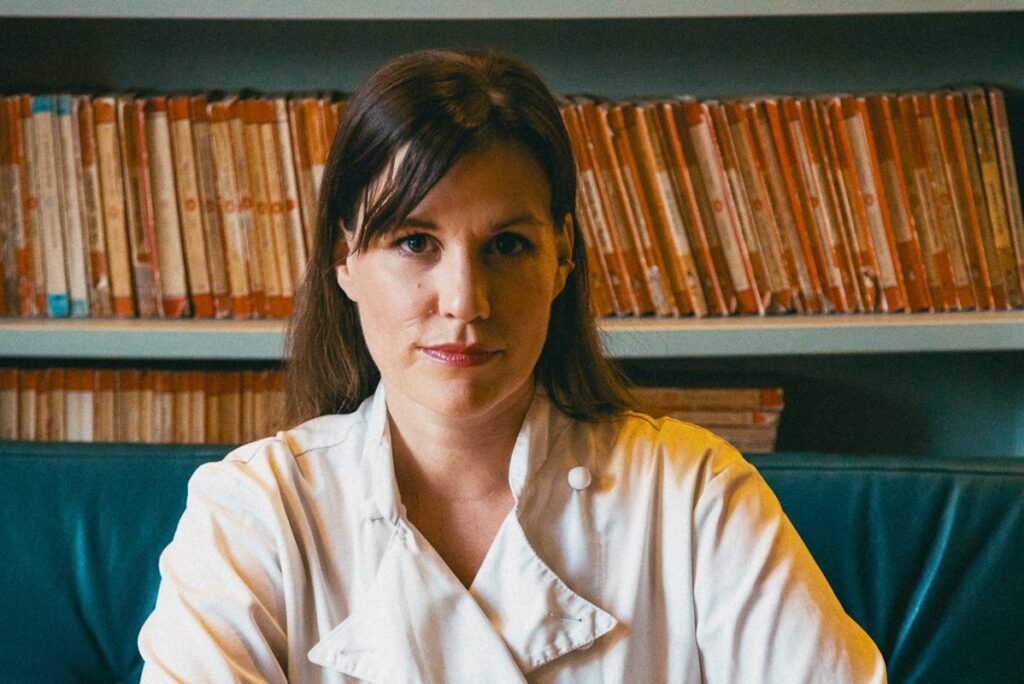 Chef Vanessa Marx has always been a champion for sustainable cooking. From ethically sourced produce to her zero waste ethos, Vanessa has always made sure that each menu she curates highlights the best sustainable practices without compromising on luxury. And now, she has brought those same practices to Bingham Riverhouse in Richmond, where she takes on the mantle of head chef.
Chef Vanessa Marx has always been a champion for sustainable cooking. From ethically sourced produce to her zero waste ethos, Vanessa has always made sure that each menu she curates highlights the best sustainable practices without compromising on luxury. And now, she has brought those same practices to Bingham Riverhouse in Richmond, where she takes on the mantle of head chef.
At the Riverhouse, chef Vanessa’s new menu highlights wild and foraged ingredients as well as some of their own garden-grown botanicals. From oyster mushrooms grown from the hotel’s waste ground coffee to fermented pineapple skins that go on to become tepeche, she is always coming up with new and innovative ways to use ingredients to their full potential.
We caught up with Vanessa Marx for the fourth instalment of our Chef’s Table series to learn about the healing power of food. Here, she tells us about her South African heritage and its many influences on her life, championing sustainability in every aspect of her cooking, being a woman in the culinary industry and her favourite childhood comfort dish.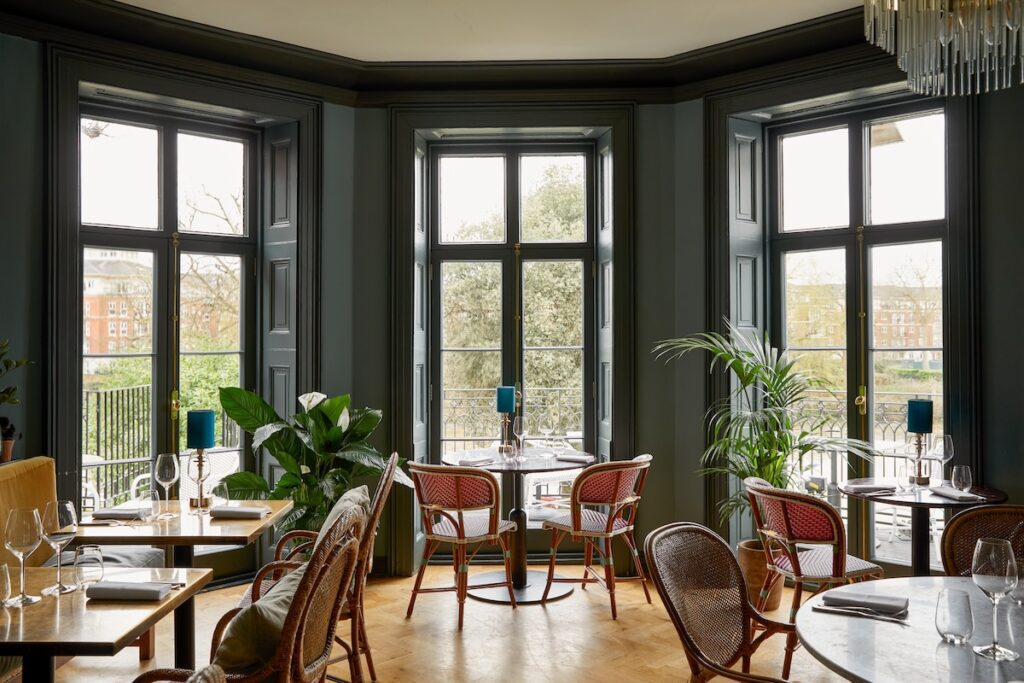 You head up the restaurant Bingham Riverhouse in Richmond. What sets your menu apart?
You head up the restaurant Bingham Riverhouse in Richmond. What sets your menu apart?
I have sourced some very unique local and seasonal produce and incorporated them into our menu. I get mushrooms grown on wasted coffee grounds at Rooftop Farm Wimbledon. And apart from the foraged seasonal ingredients and botanicals from our own garden, we’ll also be planting some more of our own produce which is exciting. I have also connected directly with selected organic and regenerative farms, and am working very closely with them on a weekly basis to develop our menus.
We try to use the most consciously sourced ingredients, and to use every last bit of what we purchase too, to reduce waste. We highlight the most incredible suppliers we have around us. The menu is fresh, colourful, seasonal and, of course, also has a little South African touch here and there.
How would you describe your style as a chef? What do you want your guests to experience?
My style is very organic and natural. It’s all about the produce for me, and retaining the freshness and unique flavour profile of each ingredient. I like to describe it as feel-good, seasonal. I want our guests to experience all of these unique ingredients and flavours, to feel at ease, relaxed and inspired.
How has your upbringing influenced your cooking?
My family is all about food. When we’re happy, we eat; when we’re sad, we eat — it’s just all about the food. This has inspired me to create food that has a sense of nostalgia, that gets people together to share and talk and be connected. Flavour is everything to me, it can evoke a specific memory and take you to a different time and place all together.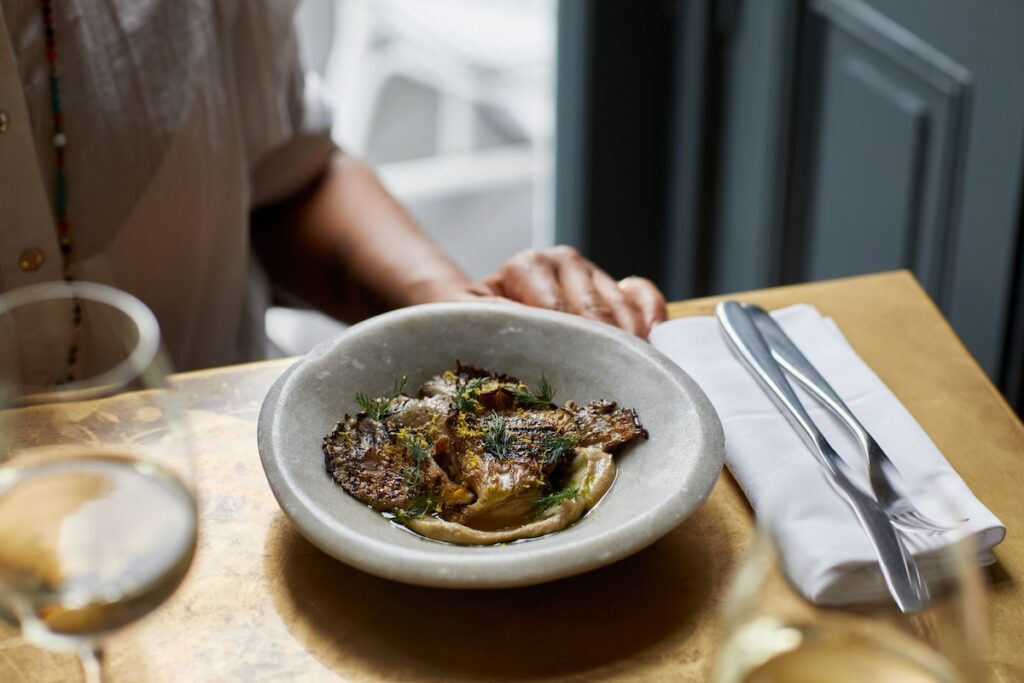 You are someone who has been a huge champion for sustainability in food. Can you talk to us more about that? What practises have you been following to make sure you stick to that ethos?
You are someone who has been a huge champion for sustainability in food. Can you talk to us more about that? What practises have you been following to make sure you stick to that ethos?
This is a huge passion for me. The fact that I get to incorporate it into my everyday practices gives me a huge sense of purpose. I love to teach, too, so passing this knowledge on to my team, and also my guests is very fulfilling.
We connect directly with our growers or suppliers as far as possible. If something is not available, we simply replace it on the menu. We adapt the menus around the producers and the seasons instead of the other way around. We reinvent much of our excess bits into imaginative new ingredients. Like fermented pineapple skins into tepache for the bar, as well as marmalade for all the citrus peels for example.
As a woman in the culinary industry, what are some of the challenges — if any — that you have faced in your career?
There are of course different challenges that come with this. Some of them are obvious, and others not as much.
I have faced bullying, ridicule and misogyny. However, I have never let it get to me. I carry on, keep my chin up and do my own thing. I come from a line of very strong women and to me, being a woman is a strength and not a weakness. I think family planning for women in our industry is a tough one. 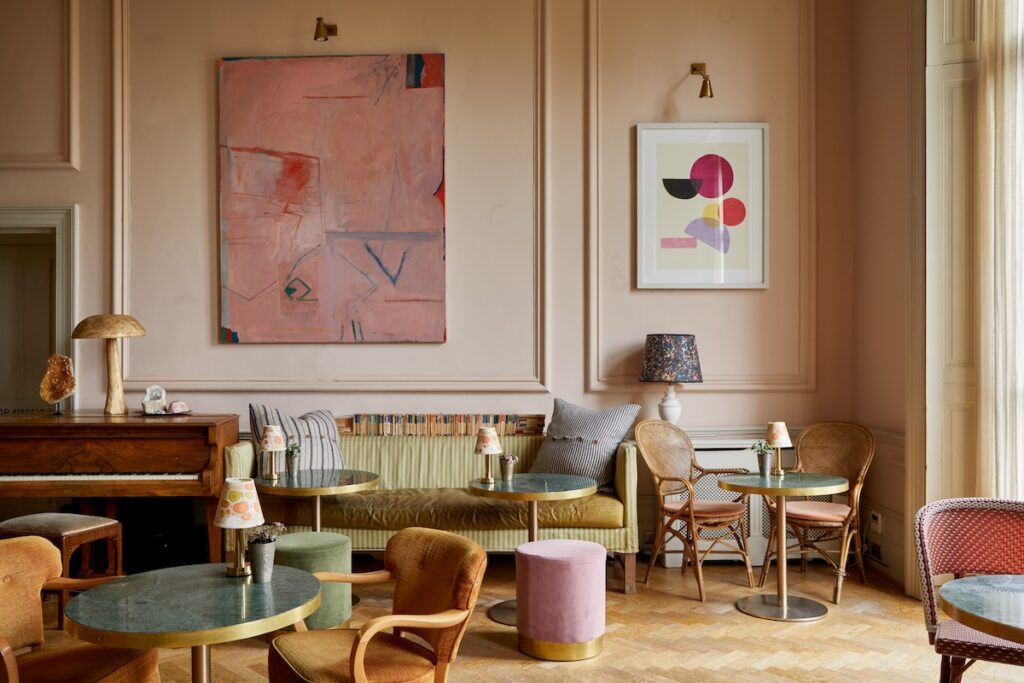 What is your ultimate comfort food? What do you make for yourself at home after a long, gruelling day or week at your restaurant? Or simply on your days off?
What is your ultimate comfort food? What do you make for yourself at home after a long, gruelling day or week at your restaurant? Or simply on your days off?
We have a South African treat called rusks. They are not like the baby biscuits you get here in the UK! It is a buttermilk based cake (you can add granola, bran flakes, dried fruit if you like). It is then sliced and dried out like a biscotti. So, at the end of a long day you can find me with a cup of tea and a couple of rusks (perfect for dunking!).
On a day off, if the sun is out, it’s definitely a braai (crispy lamb chops are my best). I also have an absolute weakness for bone marrow on toast, it reminds me of my mum making soup and she used to put the soft marrow from the bones onto fresh bread with salt.
Why is this a comfort food to you? Do you have any special memories associated with the dish?
Because of my mom. When I was little, my mom used to bake rusks for the local bake shop. On some days when she was baking the house would be filled with the warm comforting smell of malty flavoured bran rusks. Food can just transport you to a place in an instant.
If you don’t mind, can you share the recipe of this dish for our readers to emulate?
Yes, absolutely. 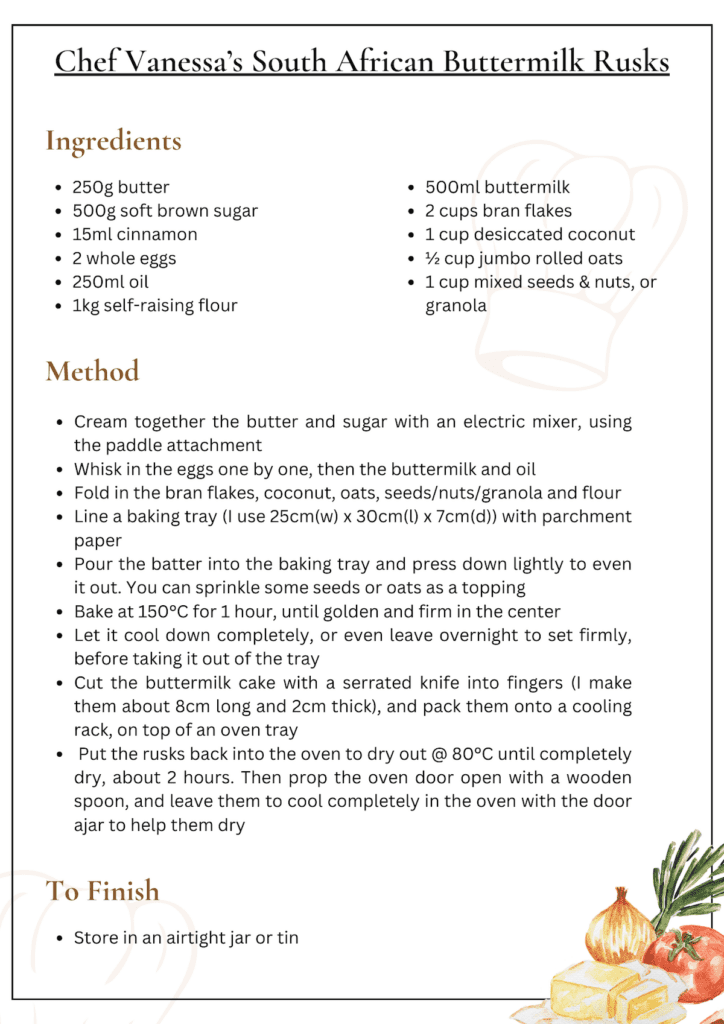 Do you have any tips for our readers attempting to recreate this dish?
Do you have any tips for our readers attempting to recreate this dish?
Be patient. You have to dry them out sufficiently. Let it cool properly before slicing to dry as well, it will prevent them from falling apart. Try to resist eating the cake warm with butter before you go to the drying out step – you won’t succeed!
Do you have any advice for people looking to cook more sustainably?
Start with one small thing. If you do one thing regularly, it becomes a habit. Then add something else. I would say two of the most important tips are: planning – this helps reduce excess purchases of food that ends up in the bin. Batch cooking is always great. And the other is knowing where your food comes from – look outside of a grocery store. Local markets, home delivery straight from farms that are local, fresh and in season.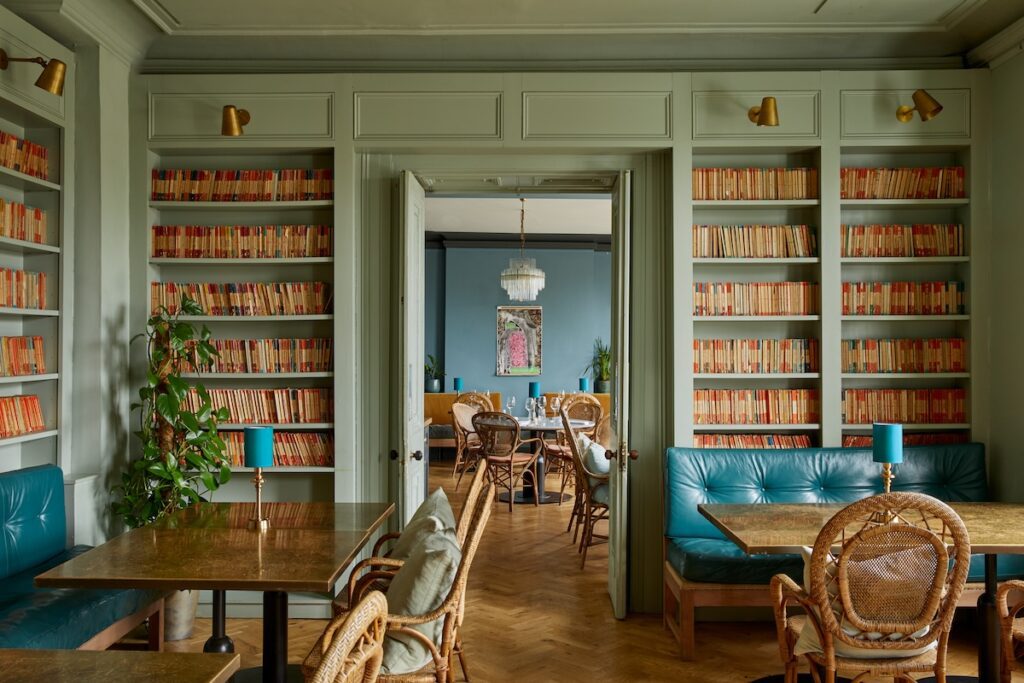 With your comfort food, have you found ways to elevate it to a fine dining level over the years? Or is it best enjoyed in its most classic form?
With your comfort food, have you found ways to elevate it to a fine dining level over the years? Or is it best enjoyed in its most classic form?
A bit of both. Sometimes I take a flavour or element of a comforting dish and then use it to create a new dish around that. Other times, there’s no need to faff around with something. You can keep it simple and make it exceptional!
To know more about Chef’s Table and chef Vanessa Marx’s cooking heroes — including the best meal she’s ever had — subscribe to our weekly newsletter, the Tempus Edit, here. And read other interviews in our Chef’s Table series here.







